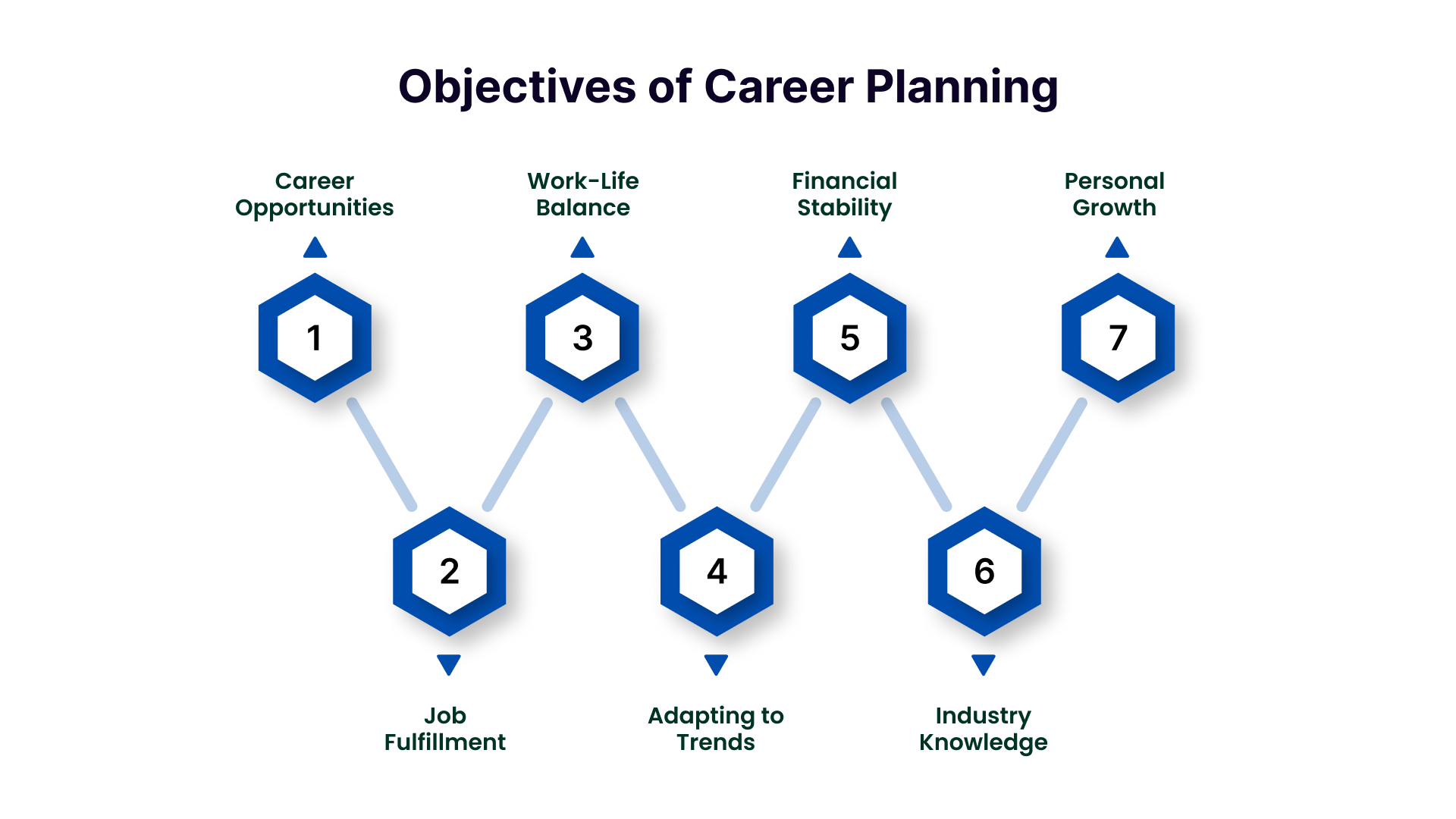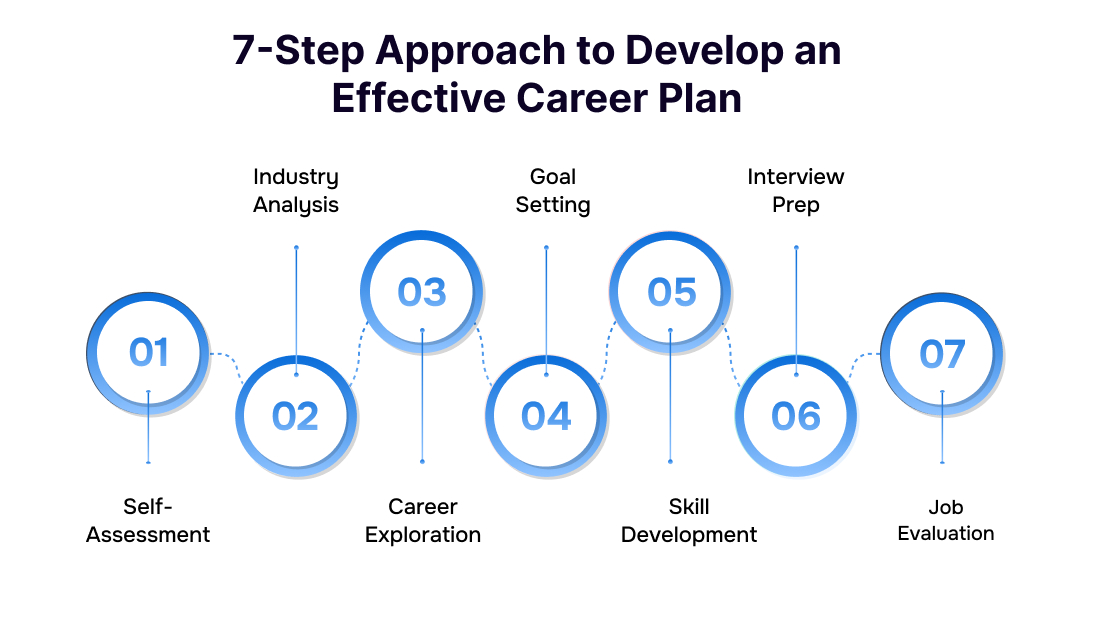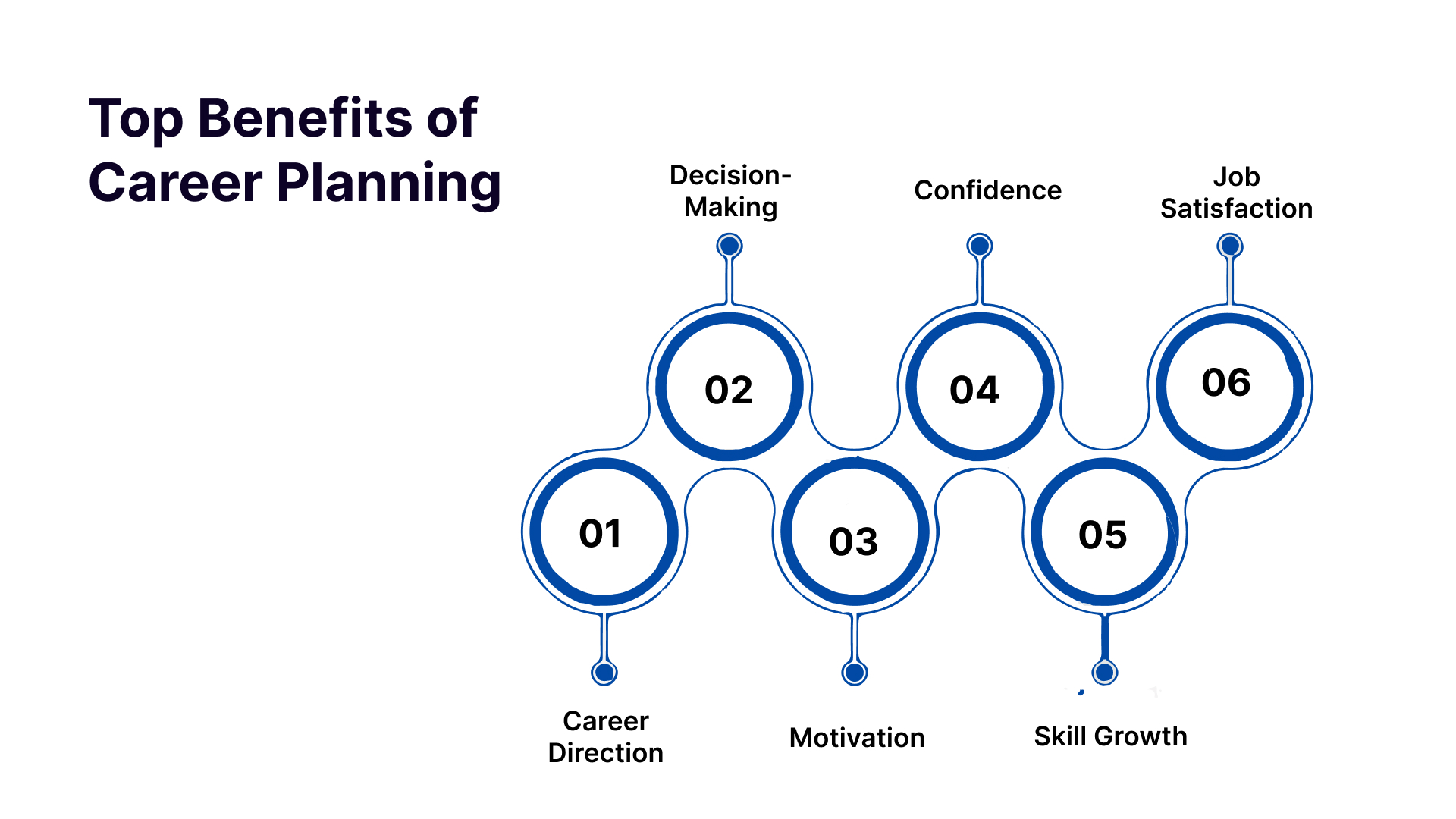July 18, 2025

Ever caught yourself wondering, “Is this the right career for me?” Or perhaps, “Am I on the path to achieving the success I’ve always envisioned?” If you have, you’re not alone. In a very shocking revelation, a staggering 93% of students weren’t even aware of the different job types available in India.
This is why career planning becomes a game changer. Career planning means proactively shaping your professional journey by setting clear goals, making well-informed decisions, and taking intentional actions. It’s essentially the blueprint that helps you understand your true potential, chart a meaningful path, and achieve the success you desire.
Think of it as constructing a building. Without a solid foundation and a clear architectural plan, it’s easy to get lost in the process. But with career planning, you lay down the groundwork, define what success looks like for you, identify the necessary skills, and create something meaningful.
In this comprehensive article, we will explore the benefits and objectives of career planning and provide you with insights and strategies to develop a plan that not only charts your path but also propels you toward success.
TL;DR (Key Takeaways)
Career planning is a continuous process that involves identifying your career goals, mapping out strategies to achieve them, and navigating various opportunities to align your professional aspirations with your skills, values, and market needs. It's about laying out a roadmap for your career to ensure you grow in the right direction without being swayed by uncertainty or missed opportunities.
Contrary to what you might think, career planning is much more than the act of choosing a career or finding a job.
With a clear understanding of what career planning is and why it’s crucial, let’s dive deeper into the specific objectives it aims to achieve.

Effective career planning is carried out with several objectives in mind that serve as the guiding principles for shaping a successful and fulfilling career. They provide clarity, direction, and focus, helping you align your aspirations with tangible outcomes.
Here are some key objectives of career planning and their impact on your professional journey.
Effective career planning enables you to anticipate and seize emerging opportunities in your industry and align your skills to meet future demands. This proactive approach of staying informed about industry trends ensures you're well-positioned to capitalize on new roles and advancements. By effectively planning your career, you make sure you're not left behind as the job market evolves.
A well-thought-out career plan takes into account your personal interests and goals. By aligning your career choices with your passions and values and choosing roles that resonate with your interests, you’re more likely to experience long-term job satisfaction and fulfillment. When you enjoy what you do, your productivity, motivation, and long-term happiness increase.
Career planning ensures you set boundaries that allow you to thrive both professionally and personally. With a clear plan, you can prioritize time for family, hobbies, and self-care. It helps you achieve a harmonious balance which helps reduce stress and prevent burnout. This balance is crucial for maintaining long-term productivity and well-being.
The job market is dynamic, with roles and industries constantly evolving. Effective career planning prepares you to be flexible and equips you with the foresight to adapt to these changes. Through continuous skill development and market awareness, you can easily navigate industry changes and remain competitive, ready to pivot as needed.
A well-defined career plan addresses your long-term financial goals. Strategic career planning involves integrating financial objectives with career growth and targeting roles with advancement potential. This way you can secure stable incomes, promotions, raises, and job stability to ensure long-term financial growth and success.
Strategic career planning emphasizes continuous learning and skill enhancement. By identifying and addressing skill gaps, you remain competitive, increase employability, and position yourself for career advancement. This commitment to upskilling and acquiring industry knowledge boosts your expertise and ensures sustained professional growth.
Career planning is a holistic approach that nurtures both personal and professional development. Through goal setting and seeking counseling, you build confidence, expand your horizons, and develop the skills necessary for comprehensive growth in various aspects of your life. This balanced development leads to a more fulfilling and successful career journey.
Unlock your career potential with Topmate’s expert mentorship and receive personalized guidance. Align your career planning with expert advice and make informed decisions for your future!

Now that we’ve explored the key objectives of career planning, let’s take a closer look at the features that will help you turn them into actionable strategies.
Career planning involves multiple key elements, each contributing to a well-rounded, purposeful, and effective career development process. Together, these features create a solid foundation for long-term success.
Let’s break down these essential features one-by-one:
By integrating these features into your career planning process, you create a comprehensive roadmap that guides your professional journey.
Having explored the features that form the backbone of career planning, let’s take it a step further to discuss some actionable steps for career success.

Building an effective career plan takes time, but with a structured approach, it becomes achievable. By following these steps, you can strategically shape your career path, make informed decisions, and adapt to changing market demands.
Here’s a 7-step foolproof method to develop your career plan.
Understanding oneself is the cornerstone of effective career planning. Start by assessing your skills, values, interests, and strengths. What are you passionate about? What skills do you excel in? Identify your non-negotiables, such as work-life balance, job stability, and opportunities for growth. Here are some ways to do that:
This self-awareness will help you identify roles that align with your intrinsic motivations, leading to greater job satisfaction and performance.
The professional landscape is dynamic, with technological advancements, economic shifts, and societal changes. You must stay informed about these industry trends and job market forecasts in order to have a fulfilling career journey. This will empower you to anticipate changes and adapt proactively, ensuring your skills remain in demand.
A good way to do this is by subscribing to industry journals, attending webinars, and networking with professionals in your field. For instance, if you're in the tech industry, you can study the rise of artificial intelligence and its implications to acquire relevant skills and position yourself strategically.
With a clear understanding of your strengths and industry trends, begin exploring potential career paths. Research various roles, their responsibilities, required skills, and growth prospects. Here’s how to do that:
After you gather all the information, narrow down your options by considering factors like job stability, growth potential, and alignment with your long-term vision.
Setting clear, measurable goals is crucial, but equally important is being flexible enough to reassess and adjust them as circumstances change. Regularly evaluate your progress and the relevance of your goals. Are they still aligned with your evolving interests and the industry's direction? Here’s how you can do that:
This adaptability ensures that your career trajectory remains fulfilling and aligned with your aspirations.
Once you’ve decided upon your desired career path, identify the skills required for success in them and assess your proficiency level in them. This could involve technical skills, such as proficiency in programming languages, or soft skills like communication and leadership.
In a time when upskilling is crucial for 88% of professionals for career growth, you can enroll in relevant courses, attend workshops, seek mentorship, and invest in continuous learning to bridge any skill gaps. Developing these competencies will enhance your employability and prepare you for future challenges and long-term success.
Your career choice will turn into a job offer only when you clear all the interview rounds, and this requires thorough preparation. Begin by properly researching the company – understand their culture, values, and recent developments. You’ll also need to practice common interview questions and formulate your responses to highlight your skills and experiences.
The best way to master interview preparation is engaging in a mock interview with your peers or mentors. This gives you the chance to practice your answers, develop your elevator pitch, and ensure you can confidently demonstrate your potential. Additionally, don’t forget to prepare thoughtful questions to ask the interviewer and demonstrate your genuine interest in the role.
Refine your interview skills with Topmate’s expert mock interviews, and take a confident step towards your career goals. Perfect your pitch and make your career planning a success!

Once you nail the interview and are finally presented with a job offer, it’s important to assess it holistically. Consider factors beyond salary and compensation, such as company culture, growth opportunities, benefits, work-life balance, and alignment with your long-term goals. If you find something missing, don't hesitate to negotiate terms that are important to you. This approach will empower you to accept a position that aligns with your career plan and personal values.
Having established a comprehensive career plan, it's essential to recognize the tangible benefits it offers.

When performed correctly, career planning goes beyond simply choosing a job and offers a multitude of benefits, from clarity in career direction to improved job satisfaction. With the right plan, you can navigate your professional journey with purpose, overcome challenges, and unlock opportunities for growth.
Let's delve into the specific benefits that effective career planning offers.
With a clear career plan, you have a defined roadmap, helping you navigate your professional journey with purpose. It equips you with the necessary steps, resources, and timelines to achieve your goals, ensuring a purposeful and directed career path. This reduces uncertainty and helps you stay focused.
A strategic career plan serves as a yardstick and enhances your ability to make informed decisions that align with your long-term goals. It encourages thoughtful consideration and reduces impulsive choices. By carefully evaluating your options and understanding the long-term impact of your choices, you develop stronger decision-making skills.
Knowing where you’re headed boosts motivation and reignites your passion for your work. Career planning helps you set tangible goals and milestones, celebrate achievements, and stay motivated. This sense of progress fosters enthusiasm and commitment, driving higher productivity levels and a more fulfilling professional experience.
As you achieve the goals outlined in your career plan, your confidence grows. Meeting career milestones builds self-esteem, reinforcing that you are capable of achieving your goals. This positive reinforcement empowers you to take on new challenges, pursue advanced roles, and navigate your career with assurance, fostering continuous growth.
Career planning encourages continuous skill development, which is key to remaining relevant in the job market. This proactive approach of engaging in targeted learning and training enhances employability, ensuring you remain competitive and adaptable in the evolving job market. The more you invest in upskilling, the better your potential for career advancement.
When your career aligns with your interests and values, job satisfaction naturally follows. A clear career trajectory fosters a sense of purpose and engagement, paving the way for career advancement and long-term professional fulfillment.
Prepare for your next career opportunity with Topmate’s expert services – from career mentorship to expert advice. Plan your career strategically and take the next step with confidence!

With a clear understanding of the benefits of career planning, it's essential to explore how to effectively implement this strategy.
To truly take control of your career, it’s not enough to just plan – you need to actively shape your path. Thankfully, there are some practical strategies that can help you stay ahead, make smarter choices, and turn your career goals into actionable steps that lead to real success.
Let’s explore some important tips to help you make the most of your career planning:
Career planning is not just a necessity; it’s a powerful tool that helps you take control of your professional journey. Having a clear career plan helps you envision where you want to go and provides the foundation for doing so. Moreover, it enables you to stay focused, adapt to industry changes, and align your career with your ultimate goal.
However, imagine having the support of experts to help you plan your career. That’s where Topmate comes in. As you plan your career, we can be your trusted partner, offering personalized mentoring and advice to help you make informed decisions.
Whether you're seeking industry-specific guidance, looking to switch careers, or just need advice on how to take the next step, we’ve got you covered. With features like personalized expert advice, job finding assistance, and mentorship for mock interviews, we equip you with everything you need to plan and execute a successful career journey.
Ready to take charge of your career? Schedule your one-on-one call with experienced mentors to unlock the insights and guidance you need. For more personalized career advice, connect with our team today!